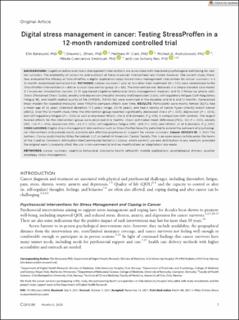| dc.contributor.author | Børøsund, Elin | |
| dc.contributor.author | Ehlers, Shawna L. | |
| dc.contributor.author | Clark, Matthew M. | |
| dc.contributor.author | Andrykowski, Michael A. | |
| dc.contributor.author | Cvancarova Småstuen, Milada | |
| dc.contributor.author | Nes, Lise Solberg | |
| dc.date.accessioned | 2022-03-21T15:01:46Z | |
| dc.date.available | 2022-03-21T15:01:46Z | |
| dc.date.created | 2021-12-08T09:42:39Z | |
| dc.date.issued | 2021-12-02 | |
| dc.identifier.citation | Cancer. 2021, 1-10. | en_US |
| dc.identifier.issn | 0008-543X | |
| dc.identifier.issn | 1097-0142 | |
| dc.identifier.uri | https://hdl.handle.net/11250/2986610 | |
| dc.description.abstract | Background: Cognitive-behavioral stress management interventions are associated with improved psychological well-being for cancer survivors. The availability of, access to, and outreach of these in-person interventions are limited, however. The current study, therefore, evaluated the efficacy of StressProffen, a digital application (app)–based stress management intervention for cancer survivors, in a 12-month randomized controlled trial.
Methods: Cancer survivors 1 year or less after their treatment (N = 172) were randomized to the StressProffen intervention (n = 84) or a usual-care control group (n = 88). The intervention was delivered in a simple blended care model: 1) 1 in-person introduction session, 2) 10 app-based cognitive-behavioral stress management modules, and 3) 2 follow-up phone calls. Stress (Perceived Stress Scale), anxiety and depression (Hospital Anxiety and Depression Scale), self-regulatory fatigue (Self-Regulatory Fatigue 18), and health-related quality of life (HRQOL; RAND-36) were examined at the baseline and at 6 and 12 months. Generalized linear models for repeated measures were fitted to compare effects over time.
Results: Participants were mainly female (82%), had a mean age of 52 years (standard deviation, 11.3 years; range, 20-78 years), and had a variety of cancer types (mostly breast cancer [48%]). Over the 12-month study time, the intervention group reported significantly decreased stress (P < .001), depression (P = .003), and self-regulatory fatigue (P = .002) as well as improved HRQOL (for 6 of 8 domains, P ≤ .015) in comparison with controls. The largest favored effects for the intervention group were observed at 6 months: stress (estimated mean difference [MD], –5.1; P < .001), anxiety (MD, –1.4; P = .015), depression (MD, –2.1; P < .001), self-regulatory fatigue (MD, –4.9; P < .001), and HRQOL (7 of 8 domains; P ≤ .037).
Conclusion: Digital stress management interventions such as StressProffen have the potential to extend the outreach of psychological interventions and provide easily available and effective psychosocial support for cancer survivors | en_US |
| dc.description.sponsorship | Funding was provided by the Norwegian Cancer Society (4602492-2013; principal investigator Lise Solberg Nes) and the Department of Digital Health Research of Oslo University Hospital (Oslo, Norway). | en_US |
| dc.language.iso | eng | en_US |
| dc.publisher | Wiley | en_US |
| dc.relation.ispartofseries | Cancer;Volume 128, Issue 7 | |
| dc.rights | Attribution-NonCommercial-NoDerivatives 4.0 Internasjonal | * |
| dc.rights.uri | http://creativecommons.org/licenses/by-nc-nd/4.0/deed.no | * |
| dc.subject | Cancer survivors | en_US |
| dc.subject | Cognitive behavioral stress | en_US |
| dc.subject | Electronic health | en_US |
| dc.subject | Mobile applications | en_US |
| dc.subject | Psychological distress | en_US |
| dc.subject | Psycho-oncology | en_US |
| dc.title | Digital stress management in cancer: Testing StressProffen in a 12-month randomized controlled trial | en_US |
| dc.type | Peer reviewed | en_US |
| dc.type | Journal article | en_US |
| dc.description.version | publishedVersion | en_US |
| dc.source.articlenumber | 1503-1512 | en_US |
| cristin.ispublished | true | |
| cristin.fulltext | original | |
| cristin.qualitycode | 2 | |
| dc.identifier.doi | https://doi.org/10.1002/cncr.34046 | |
| dc.identifier.cristin | 1965964 | |
| dc.source.journal | Cancer | en_US |
| dc.source.volume | 128 | en_US |
| dc.source.issue | 7 | en_US |
| dc.source.pagenumber | 1-10 | en_US |
| dc.relation.project | Kreftforeningen: 4602492-2013 | en_US |

